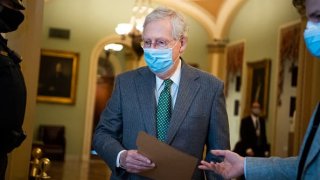
Negotiations on a stimulus deal between Democratic House Speaker Nancy Pelosi and Republican Senate Majority Leader Mitch McConnell are currently underway, with both parties saying they'd like to reach a consensus before government funding runs out on Dec. 11.
The two sides have had months to pass another relief bill. Now, there is some traction on a $908 billion bill put together by a bipartisan group of lawmakers that includes some enhanced unemployment benefits, support for small businesses, a continuation of the federal student loan deferral and more. President-elect Joe Biden called the bill "a good start" on Thursday.
McConnell, however, rejected the bipartisan effort, pushing instead for a $500 billion bill that includes another round of Paycheck Protection Program funding and liability insurance for employers. The latter is a no-go for Democrats. McConnell's bill does not include enhanced federal unemployment payments. Neither bill includes another round of stimulus checks.
As the two sides continue to negotiate, there is a lot on the line. Without a deal, 66% of Americans currently collecting unemployment benefits will lose them by Dec. 26, according to Morning Consult. Almost 83 million adults reported in November that their household had a difficult time paying for essentials like food, housing, transportation, medical expenses or other bills, according to the U.S. Census Bureau's most recent Household Pulse survey.
These are the relief measures that expire at the end of the year without another deal:
Gig workers and freelancers will lose jobless benefits
An estimated 7.3 million gig workers, freelancers and self-employed workers who don't normally qualify for jobless benefits will lose their payments on Dec. 26, when the Pandemic Unemployment Assistance (PUA) program expires, according to a recent report from The Century Foundation, a progressive think tank.
Money Report
"Without unemployment benefits and with savings badly depleted, families will be at high risk for food insecurity and loss of their homes, and many may be unable to pay for health care during some of the darkest days of the pandemic," TCF's report reads.
Though lawmakers have not released the text of the bipartisan bill, it does include $180 billion in unemployment insurance, including an extra $300 per week from December through March 2021. The Washington Post reported the bill is likely to include a continuation for gig and freelance workers.
Long-term unemployed will lose jobless benefits
Several million more workers will also lose all of their benefits when the Pandemic Unemployment Emergency Compensation (PUEC) program expires. This program extended the maximum number of weeks someone could collect benefits to 39 weeks in most places, from an average of 26 weeks.
But as coronavirus cases across the country continue to surge, the number of people who have been unemployed for more than 26 weeks continues to grow each month. Again, though the text of the bipartisan bill is not out, it is likely to include an extension of benefits into 2021.
Eviction protections expire
Millions of people are at risk of being evicted if the nationwide eviction moratorium expires on Dec. 31 with no further action from states or the federal government.
The bipartisan proposal includes $25 billion in rental relief. Housing advocates have been calling for $100 billion to make up for the months of missed or late payments for millions of tenants. Additionally, the CDC or Congress would need to extend the eviction moratorium that is currently in effect.
Federal student loan payments will resume
Come January, tens of millions of borrowers will have to resume making student loan payments. Experts worry that millions will be unable to make their payments come January, and student loan servicers will be overwhelmed by the number of borrowers who need to request hardship relief at that time, like an unemployment deferment for those without a job.
The bipartisan bill allocates $4 billion to keep the payment pause going, likely at least through Biden's inauguration in January.
Check out: Americans' message to the next president: Pass more stimulus
Don't miss: You have 2 weeks left to earn the Amex Blue Cash Preferred’s elevated $300 welcome bonus






